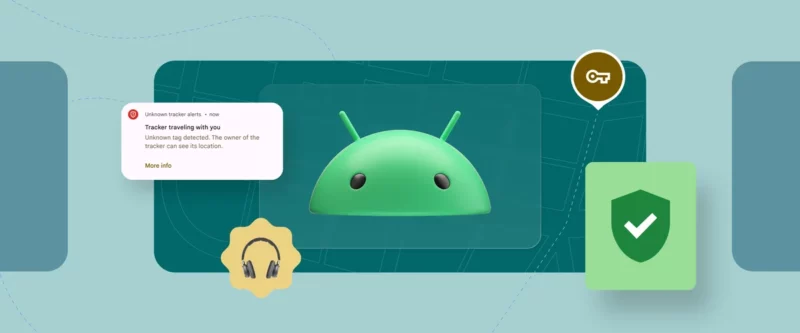
After the release of Apple’s AirTags, Google suddenly has an interest in the Bluetooth tracker market. The company has quietly launched what should be the world’s largest Bluetooth tracking network through 3 billion active Android devices, and now trackers are starting to plug into that network. Google took the ecosystem approach and allowed different companies to plug into the Android Bluetooth tracking network, with the original name “Find My Device.”
While these Bluetooth trackers are great for finding your lost car keys on a cluttered desk, they can also act as global GPS trackers and find things far away, even if they don’t have GPS. The IDs of Bluetooth devices are public, so Tile started this whole crowdsourced Bluetooth location tracker idea, called the “Tile Network.” Every phone with the Tile app installed scans for Bluetooth devices in the background and, using the phone’s GPS, uploads their last seen location to the cloud. This location data is only available to the person who owns the Tile, but each Tile user works to scan the environment and upload any Tiles the app finds.
Tile is a popular product, but it’s not on the scale of our favorite smartphone duopoly, Apple and Google. Apple upped the ante when it released AirTags and launched a bluetooth tracking network for most of the 1.8 billion Apple devices out there. While the Tile will reliably work in busy places like airports, you’re unlikely to be more than a few hundred feet from an iPhone at any given time, making for a very viable tracking network. all over the world.
As usual, Google wants to do something similar, and in December 2022, Google brought more network locations “Find My Device” to Android. Previously, you were the only one who logged the last known location of your devices, but this update enables the phone for anyone to upload the location of your devices. Android is terrible at sending OS updates, but this isn’t an OS update; it comes through Google Play Services, which is just an app that comes through the Play Store. This means that overnight, 3 billion active Android phones received the crowdsourced tracking network update. The only problem is that it only tracks Android phones, not any Bluetooth tags.
-
Chipolo’s card and tag tracker.
Chipolo
-
Pebblebee trackers, all of which are rechargeable.
Pebblebee
-
Setup should be easy with Chipolo products. Google’s “Fast Pair” feature pops up setup instructions on your phone the second you turn on the trackers.
Chipolo
Now, third-party Bluetooth trackers for the Android network are starting to arrive. The two companies advertising the products are Chipolo and Pebblebee, both of which clone the Tile product line. Both offer a normal keychain tracker tag and a slim credit card format tracker. Tile’s worst habit involves making completely disposable products because the batteries are not replaceable, but it seems our clones mostly avoid that. All of Pebblebee’s Find My Device products are rechargeable, which is great, while the Chipolo keychain tracker has a replaceable CR2032 battery. Only the Chipolo wallet tracker works (boo!).
All of these tags can be found in the Find My Device app, right next to your Android phones, headphones, and anything else you have plugged into the network. They also have a speaker, as usual, so you can make them sound when you’re nearby. Both sets of products are up for pre-order now.
Both of these companies support Google and Apple networks but have to make different versions of the same product for each network, which is kind of funny. Chipolo is really awkward and has three sets of products: a version that works with the company’s in-house apps, one that works with Apple’s Find My Network, and one that works with Google’s Find My Device Network. We can’t really consolidate it? Both Google and Apple have joined forces to try to combat the malicious use of these tracking devices with a unified standard, can’t they also unify hardware support? Just Bluetooth!
Tile, which is being eaten alive by Big Tech, has not yet plugged into any of these networks, but Google’s blog post says that Tile will eventually join Find My Device. Google is reportedly planning its own Bluetooth tracker in the future, too.
